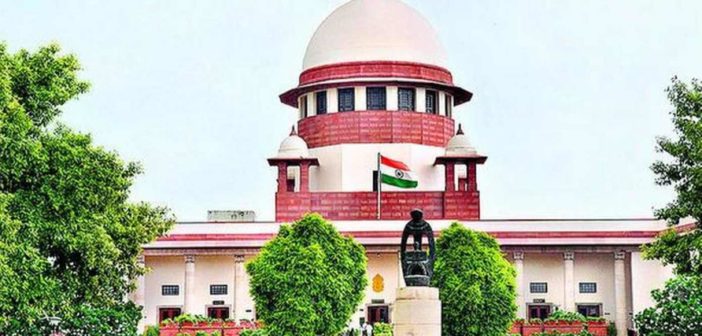In this edition of the court judgments review, we examine the Supreme Court’s ruling that freed a POCSO convict to preserve family harmony, its decision that minor discrepancies don’t nullify a Dying Declaration in Homicide Cases, Delhi HC’s ruling that allowed a couple to proceed with Surrogacy despite the Husband crossing the statutory age bar, among others.
Supreme Court: POCSO Convict Freed to Preserve Family Harmony
In K. Kirubakaran vs. State of Tamil Nadu, the Supreme Court quashed the conviction of a man under Section 366 IPC and Section 6 of the POCSO Act, holding that in exceptional circumstances, justice and compassion may prevail over rigid application of law.
The appellant had been sentenced to five and ten years of rigorous imprisonment for kidnapping and sexually assaulting a minor. His appeal before the Madras High Court was dismissed in 2021. During the proceedings, he married the victim, and they now have a child under one year old. Seeking relief under Article 142, he urged the Supreme Court to quash his conviction to preserve his family life.
The appellant’s wife submitted an affidavit expressing her dependence on him and her desire to live peacefully with him and their child. The victim’s father also raised no objection.
Justice Dipankar Datta observed that while a crime is an offence against society, the law must be applied with empathy when warranted. Quoting Justice Benjamin Cardozo, he noted, “The final cause of law is the welfare of society.” The Court reasoned that the offence stemmed from love rather than lust, and further punishment would harm the wife, infant, and social harmony.
Invoking its powers under Article 142, the Court quashed the conviction and directed the appellant to maintain his wife and child with dignity. It clarified that the order was based on unique facts and should not be treated as a precedent.
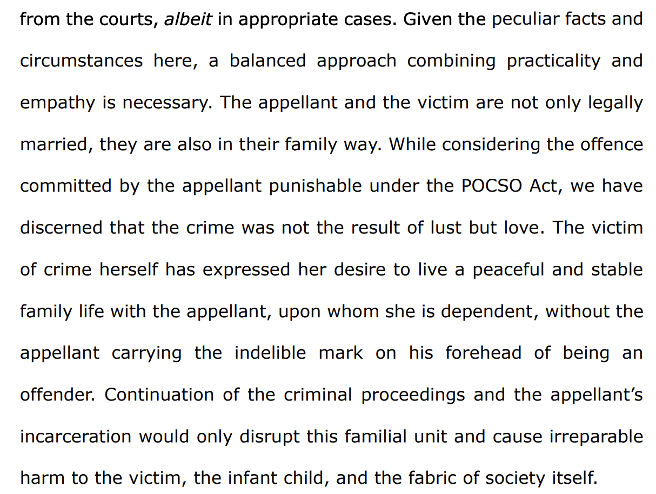
Supreme Court: Minor Discrepancies Don’t Nullify Dying Declaration in Homicide Cases
In Jemaben vs. State of Gujarat, the Supreme Court upheld the Gujarat High Court’s conviction of a woman for the murder of her niece-in-law, holding that a dying declaration made before an independent medical officer can form a reliable basis for conviction when corroborated by other evidence.
The case arose from a 2004 incident in Banaskantha, where the accused, Jemaben, allegedly poured kerosene on her niece-in-law, Leelaben, and set her ablaze while she and her son were asleep. Leelaben later died of 100% burn injuries, while her four-year-old son sustained minor burns. The trial court had acquitted Jemaben, citing inconsistencies in three dying declarations, but the High Court reversed the acquittal in 2016 and sentenced her to life imprisonment.
Before the Supreme Court, the defence argued that inconsistencies in the dying declarations created doubt. The State maintained that the first declaration, recorded by a doctor immediately after the incident, clearly identified Jemaben as the perpetrator and was corroborated by physical evidence, including kerosene traces and burn patterns.
The Court held that minor variations in dying declarations do not render them unreliable when the first statement is consistent and supported by independent evidence. Dismissing the appeal, it affirmed the conviction and sentence.
This ruling reinforces that a credible dying declaration, when corroborated by independent proof, can form the sole basis for conviction in homicide cases.
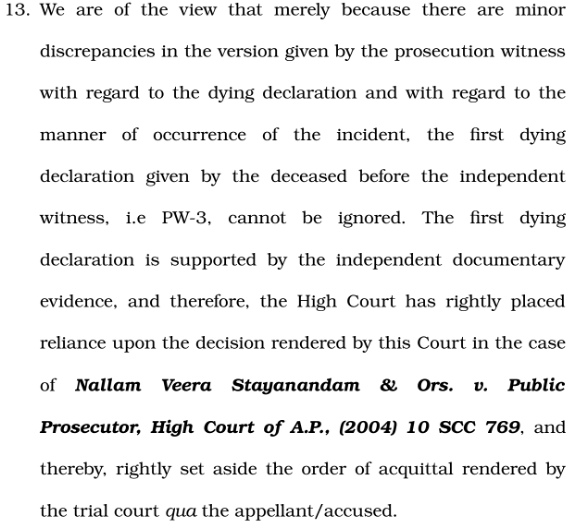
Delhi HC: Couple Allowed to Proceed with Surrogacy Despite Husband Crossing Statutory Age Bar
In Tapas Kumar Mallick & Anr. vs. Union of India & Anr., the Delhi High Court permitted a couple to proceed with the surrogacy process, holding that the upper age limit prescribed under Section 4(iii)(v)(c)(I) of the Surrogacy (Regulation) Act, 2021, does not apply retrospectively to couples who began the procedure before the Act came into force.
The petitioners, a 57-year-old husband and 42-year-old wife, were denied eligibility for surrogacy as the husband exceeded the statutory age limit of 55 years. They contended that they had initiated the process in January 2021 and frozen embryos before the Act’s enforcement in January 2022, and that retrospective application violated their reproductive autonomy under Article 21.
Justice Sachin Datta relied on the Supreme Court’s ruling in Vijaya Kumari S & Another vs. Union of India, which held that couples who had completed embryo creation and freezing before the Act’s commencement could not be barred by the new age restrictions.
Holding that the petitioners’ surrogacy process had commenced before the Act’s implementation, the Court allowed them to proceed without a fresh eligibility certificate, subject to compliance with other statutory conditions.
This ruling reinforces that age limits under the Surrogacy Act cannot be applied retrospectively and safeguards the reproductive rights of couples who began treatment before the law’s enforcement.
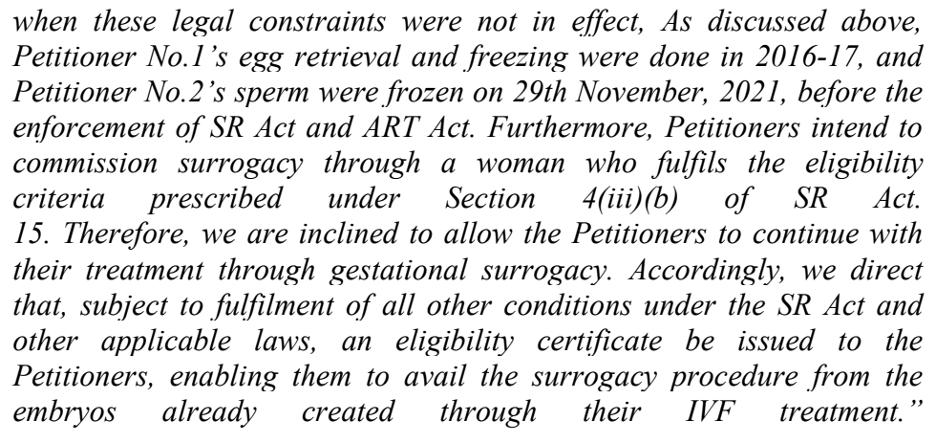
Supreme Court: Mere Recovery of Currency Notes Insufficient for Conviction Without Proof of Demand and Acceptance
In P. Somaraju vs. State of Andhra Pradesh, the Supreme Court set aside the Andhra Pradesh High Court’s conviction of a labour official under the Prevention of Corruption Act, reinstating his earlier acquittal. The Court held that mere recovery of tainted money is not sufficient to establish guilt unless demand and acceptance of illegal gratification are proved beyond a reasonable doubt.
The case stemmed from a 1997 Anti-Corruption Bureau trap, where the appellant, an Assistant Commissioner of Labour, was accused of demanding a ₹9,000 bribe and accepting ₹3,000 for licence renewals. The trial court acquitted him, citing inconsistencies in witness statements, procedural lapses, and a lack of credible proof of demand or acceptance. The High Court reversed the acquittal and convicted him.
Justice Prashant Kumar Mishra, writing for the Bench, reaffirmed the principles laid down in Chandrappa vs. State of Karnataka and Rajesh Gupta vs. CBI, emphasising the “double presumption of innocence” following acquittal. Finding that the High Court failed to show any perversity in the trial court’s findings, the Supreme Court restored the acquittal.
This ruling reinforces that conviction under the Prevention of Corruption Act requires clear proof of demand and acceptance, not mere possession of tainted currency.
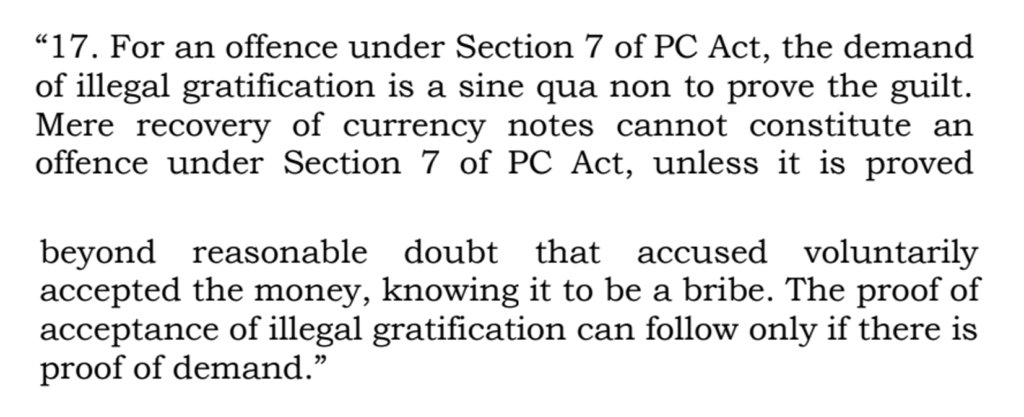
Delhi HC: Bail Condition Restricting Doctor from Running His Medical Centre Does Not Violate Right to Livelihood
In Neeraj Agarwal vs. State (NCT of Delhi) & Anr., the Delhi High Court upheld a bail condition restricting a doctor from operating his medical centre, holding that it does not violate the fundamental right to livelihood under Article 19(1)(g) of the Constitution.
The case arose from an FIR alleging that unqualified persons had performed surgeries at the petitioner’s clinic, leading to a patient’s death during a gallbladder operation. Dr. Neeraj Agarwal, owner of Agarwal Medical Centre, was charged under multiple provisions of the IPC and granted bail in 2024 with conditions barring him from running his clinic and from leaving Delhi without permission.
Seeking modification, the petitioner argued that the restriction deprived him of his livelihood. Justice Subramonium Prasad held that bail conditions may restrict activities linked to the alleged offence to prevent recurrence. The Court clarified that the restriction applied only to operating his own centre and did not prevent him from practising as a doctor elsewhere.
It declined to lift the restriction but permitted him to travel outside Delhi with prior court approval after surrendering his passport.
The ruling affirms that reasonable bail conditions aimed at ensuring a fair trial and preventing repetition of alleged offences are constitutionally valid.



